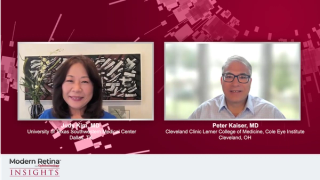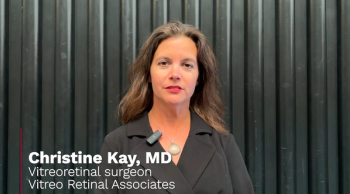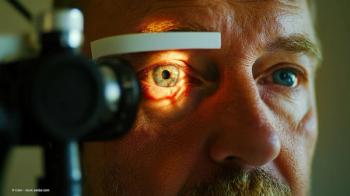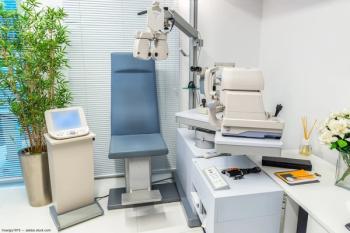
AMD
Latest News

LumiThera announces top-line results from LIGHTSITE IIIB extension trial assessing the Valeda Light Delivery System
Latest Videos

CME Content
More News

The phase 2 clinical trial data evaluating the efficacy, safety, and dosing intervals of high-dose IBI302 were presented during the annual 2025 ARVO meeting.


The PRISM clinical trial assesses 4D-150 (4D Molecular Therapeutics) in adults with neovascular age-related macular degeneration, also known as wet AMD.

Authors of the study believe this potential will provide clinicians with valuable information about patient responses to treatment.

This agreement allows a launch in the US in the second half of 2026 or earlier in certain circumstances.

Compensation techniques in swept-source optical coherence tomography angiography improve accuracy by correcting signal loss from drusen and other artifacts.

The first session of the 2025 COPHy meeting was titled "Big controversies in retina and beyond in 2025.”

Researchers assessed the costs to patients and caregivers in Germany, Bulgaria and the US

This large study sought to determine if daily supplementation with cocoa extract, a source of flavanols, reduces the occurrence or progression of AMD.

The decision to discontinue the trials comes shortly after the announcement that COAST missed its primary endpoint.

Opthea phase 3 clinical trial, COAST, in patients with wet age-related macular degeneration fails to meet primary endpoint
The trial evaluated sozinibercept (2 mg) every 4 or 8 weeks in combination with aflibercept (2 mg), as per label, every 8 weeks after a loading phase for the treatment of wet AMD.

The investigators retrospectively evaluated 126 consecutive treatment-naïve nAMD patients (126 eyes) who received a loading dose of a minimum of three monthly intravitreal aflibercept injections that was followed by a TAE.

Among the promising areas of retinal disease research are innovative approaches targeting pan-vascular endothelial growth factor inhibition.

4D-150 is a potential backbone therapy that is designed to provide multi-year sustained delivery of anti-VEGF (aflibercept and anti-VEGF-C) from the retina with a single, safe, intravitreal injection.

The findings were from 6 patients in the first low-dose cohort of the ongoing first-in-human trial (NCT04627428).

Retina Resource was developed by retina specialists for retina specialists.

ABI-201 aims to prevent dry AMD and other retinal disorders in patients.

The data was included in the paper, titled “Sozinibercept Combination Therapy for Neovascular Age-Related Macular Degeneration: Phase 2b Study Subgroup Analysis by Lesion Type.”

Ixo-vec utilizes a proprietary vector capsid, AAV.7m8, carrying an aflibercept coding sequence under the control of a proprietary expression cassette and is designed to be administered as a one-time intravitreal injection.

If approved, the drug will be branded as LYTENAVA.

RPESC-RPE-4W is a cell product derived from adult retinal pigment epithelial stem cells.

AVT06 is Alvotech’s proposed biosimilar to Eylea (aflibercept) 2mg.

Panelists discuss how longer-acting treatments will enable extended intervals between visits while requiring careful adjustment of monitoring protocols and clinic workflows to balance reduced treatment burden with maintaining adequate disease surveillance.

The topline results from the COAST trial is anticipated in early Q2 of 2025.

PST-611, a first in class non-viral vectorized therapy expressing human transferrin, a highly potent iron regulator.





























